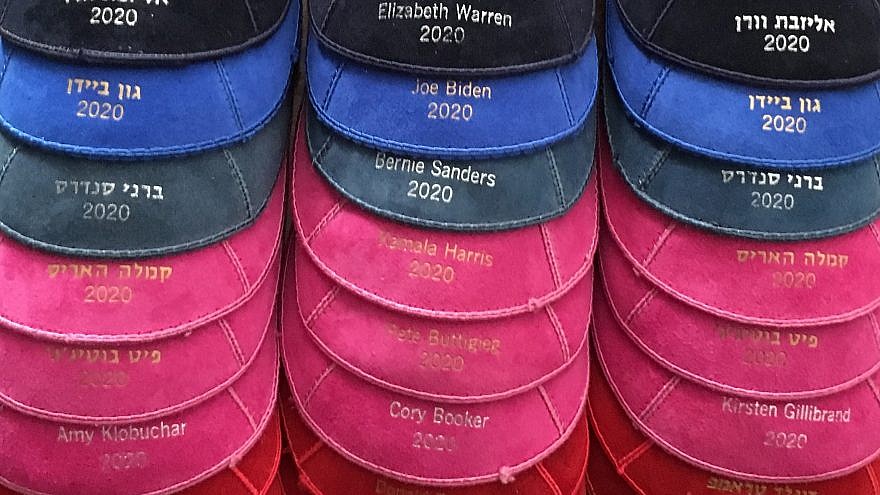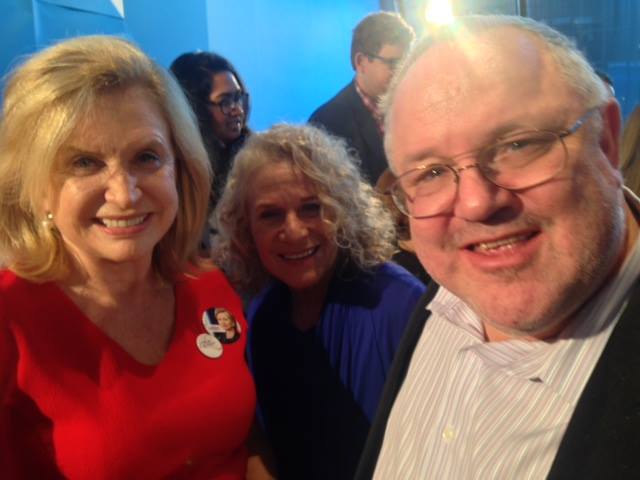Along with giving out kipot to put on one’s head, Marc Daniels, a published author and the director of an independent marketing and consulting company, is also seeking to get wearers and non-wearers—from presidential candidates to others—to think about how people can come together amid modern-day divisiveness.
It started back in 2015, when Daniels, 64, who grew up in Des Moines, Iowa, and now lives in the Illinois capital of Springfield, went to his first rally for then-presidential candidate Donald Trump.
“I was trying to figure out a way to stand out in the crowd, and I took a kipah from my car and I managed to get in the front row, and I asked Trump if he could sign my kipah—and he did,” Daniels told JNS.
Later that year in Iowa, Daniels approached the eventual Democratic presidential nominee, former U.S. Secretary of State Hillary Clinton, and mentioned that after visiting the grounds of the Dachau concentration camp in Germany, he thought of the idea to connect gardening with Kabbalah “to inspire kids to relate to composting weeds and hatred into hope every time they garden.”
By then, Daniels had customized kipot printed with the names of the candidates on the outside and a message on the inside that read, “Weed out hate, sow seeds of peace.” He presented individual ones to Republican candidates former New Jersey Gov. Chris Christie, Florida Sen. Marco Rubio and then-Ohio Gov. John Kasich.
“During the retail politicking, I have a chance to relate or disseminate the idea of weeding out hate,” said Daniels.
‘Blown away by the response’
At the 2016 AIPAC Policy Conference in Washington, D.C., he had a backpack billboard with customized separate kipot with campaign logos and the names of Clinton, Vermont Sen. Bernie Sanders and Trump etched on them. (Sanders is also a candidate for the 2020 Democratic presidential nomination.)
Daniels stood outside the Verizon Center (its name at the time), where the candidates, except for Sanders, spoke; afterwards, attendees filed out the building, and “they flipped out over the idea of buying a Donald Trump yarmulke.”
Daniels’s side business made headlines in Haaretz, The New York Post, The Washington Free Beacon and other media outlets.
The Trump kipot were sold out; Daniels even had some orders that he couldn’t fill. “I was totally blown away by the response by the Jewish community,” he said. “A personalized yarmulke is one of those powerful symbols; when you combine it with politics, it attracts [your] attention.”
The kipot are manufactured by a supplier in Brooklyn called J. Lowy, which he contracted. Daniels recalled that following the Post coverage, he started getting “hundreds of orders a day.”
In the current presidential election cycle, candidate kipot available are Trump; Sanders; former U.S. Vice President Joe Biden; Pete Buttigieg; Sen. Amy Klobuchar (D-Minn.); Sen. Kirsten Gillibrand (D-N.Y.); Cory Booker (D-N.J.); Sen. Elizabeth Warren (D-Mass.); and Sen. Kamala Harris (D-Calif.).
A one-man business, Daniels has been in Iowa, including at the recently concluded Iowa State Fair, and plans again to attend the AIPAC Policy Conference next March.
“I use the kipah as a means to attract attention, to attract the candidate’s attention,” he said.
While campaign kipot have existed even before 2015, Daniels has a personalized one to give to each candidate, along with providing “a Jewish take on things that they can use in their own campaigning.”
For example, he gave a customized pink yarmulke to Gillibrand, who withdrew from the Democratic primary on Sept. 4 in St. Louis a few ago, along with a JTA article about the Talmud’s view of when a human life begins, which is also a crucial (some say, loaded) political question pertaining to the abortion issue.
Politics and religion are known as some of the most contested topics to be discussed societally.
Still, Daniels said there’s no danger in intersecting the two through promoting and wearing the customized candidate kipot.
“I use the kipah as a way … for a higher mission to fill in the gaps in void of campaign strategists that they may not have always been aware of,” he said.
Daniels mentioned that his favorite candidate kipah is the Sanders’s one.
“I like Bernie the best for a lot of reasons,” he said. “If he would only understand the power that he has by rooting the socialism and spirituality, which I don’t think he wants to do, he’d be a lot further.”
During the 2016 cycle, Daniels sold 1,500 kipot. So far, he’s sold 50 kipot in the current presidential campaign cycle, though cautioned that it’s still “too early,” as the Democratic primary field narrows. The Bernie kipah is so far what’s most in demand.




























